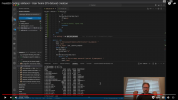I've been using ZFS encrypted datasets pretty much since the first day of availability. On this forum and also the mailing lists I see a lot of people running ZFS "on top of" GELI.
I'd like to ask: Is that usually more of a legacy thing or are there situations where one would prefer ZFS on GELI rather than just using native ZFS encrypted datasets?
I'd like to ask: Is that usually more of a legacy thing or are there situations where one would prefer ZFS on GELI rather than just using native ZFS encrypted datasets?


